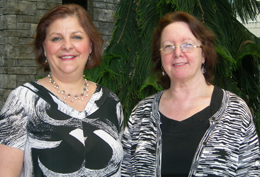Major grant for cancer screening promotion among low-income communities

A researcher from McMaster’s School of Nursing, along with a team of Hamilton public health nurses, has received nearly $1 million from the Public Health Agency of Canada to promote screening for three types of cancer among people living in low-income communities.
The Creating Access to Screening and Training in the Living Environment (CASTLE) project will promote breast, cervical and colorectal cancer screening to residents of low-income housing communities through a multi-sectoral network that encourages community engagement.
The project will be led by assistant professor Olive Wahoush and Hamilton Public Health Services, in partnership with the public health units from Halton, Niagara, Haldimand-Norfolk and Brant County, as well as Brock University.
Hamilton is the pilot site, with expansion planned for the fall into Halton, Niagara, Haldimand-Norfolk, Brant County and Aboriginal communities in the area.
Wahoush said her team will target low-income residents who are less likely to have been screened.
“It’s working with these communities to develop messages around cancer screening and how best to reach them,” said Wahoush. “We want to see what works best to promote cancer screening, in communities across Canada. It’s not just that they become aware, but that they actually take action and get screened.”
Angela Frisina is a co-principal investigator on the project and a Hamilton public health nurse for the Chronic Disease Prevention Program. She said since low-income populations tend to be under-screened, cancer is often diagnosed too late.
“Cancer screening is probably not the first thing on their mind when it comes to their health,” said Frisina, who is also a clinical lecturer with the School of Nursing. “It’s how do I get food on the table? Do I need to take time off work? Who will take care of my family?”
The project is just getting underway and will be completed by March, 2014.
The model involves the development of a CASTLE network; hiring a social marketing consultant to help develop messages and promotional items like a website and videos; and working with community organizations and community health brokers to develop appropriate messages. One such person recruited from each region will be trained to deliver cancer screening messages in low-income housing communities with the help of cancer screening ambassadors, who are volunteer residents.
“We’re really taking the notion of being at risk or vulnerable and applying it in a more inclusive manner. It’s a step toward more equitable health care,” she said.
For further information on CASTLE, email castle@hamilton.ca.

